Related Research Articles

Sir Cliff Richard is a British singer and actor. He has total sales of over 21.5 million singles in the United Kingdom and, as of 2012, was the third-top-selling artist in UK Singles Chart history, behind the Beatles and Elvis Presley.
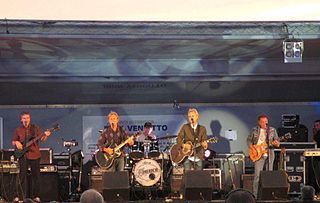
America are a British-American rock band formed in London in 1970 by English-born American Dewey Bunnell and Americans Dan Peek and Gerry Beckley. The trio met as sons of US Air Force personnel stationed in London, where they began performing live. Achieving significant popularity in the 1970s, the trio was famous for its close vocal harmonies and light acoustic folk rock sound. The band released a string of hit albums and singles, many of which found airplay on pop and soft rock stations.

John Brumwell Mayall was an English blues and rock musician, songwriter and producer. In the 1960s, he formed John Mayall & the Bluesbreakers, a band that has counted among its members some of the most famous blues and blues rock musicians. A singer, guitarist, harmonica player, and keyboardist, he had a career that spanned nearly seven decades, remaining an active musician until his death aged 90. Mayall has often been referred to as the "godfather of the British blues", and was inducted into the Rock and Roll Hall of Fame in the musical influence category in 2024.
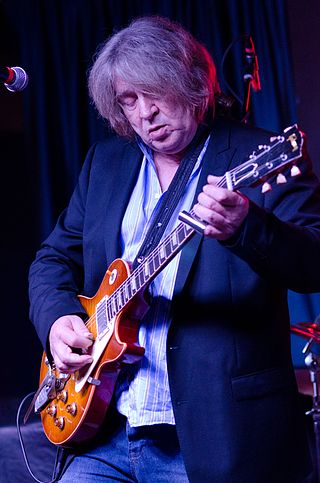
Michael Kevin Taylor is an English guitarist, best known as a former member of John Mayall's Bluesbreakers (1967–1969) and the Rolling Stones (1969–1974). As a member of the Stones, he appeared on Let It Bleed (1969), Get Yer Ya-Ya's Out! (1970), Sticky Fingers (1971), Exile on Main St. (1972), Goats Head Soup (1973) It's Only Rock 'n Roll (1974), and Tattoo You (1981).

Hank Brian Marvin is an English multi-instrumentalist, vocalist, and songwriter. He is known as the lead guitarist for the Shadows.

Kenneth William David Hensley was an English musician, singer, songwriter and producer, best known for his work with Uriah Heep during the 1970s.

Norman William Paramor, known professionally as Norrie Paramor, was a British record producer, composer, arranger, pianist, bandleader, and orchestral conductor. He is best known for his work with Cliff Richard and the Shadows, both together and separately, steering their early careers and producing and arranging most of their material from the late 1950s to the early 1970s. Paramor was an orchestra conductor and composer of music for studio albums, theatrical productions, and film scores.

The Shadows were an English instrumental rock group, who dominated the British popular music charts in the pre-Beatles era from the late 1950s to the early 1960s. They served as the backing band for Cliff Richard from 1958 to 1968, and have joined him for several reunion tours.

Bruce Cripps, known professionally as Bruce Welch, is an English guitarist, songwriter, producer, singer and businessman best known as a founding member of the Shadows.
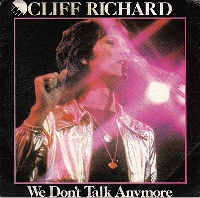
"We Don't Talk Anymore" is a song recorded by Cliff Richard, written by Alan Tarney and produced by the Shadows' rhythm guitarist, Bruce Welch. It was released in 1979 as a single and reached number one in the UK Singles Chart in August 1979, remaining there for four weeks, Richard's tenth UK number one and his first since "Congratulations" in 1968.

"Living Doll" is a song written by Lionel Bart made popular by Cliff Richard and the Shadows in 1959. It was the top selling single in the UK in 1959. It has topped the UK charts twice: in its original version in 1959 and a new version recorded in 1986 in aid of Comic Relief. It is one of the few songs released by a British singer to chart on the American Billboard charts before the British Invasion occurred.
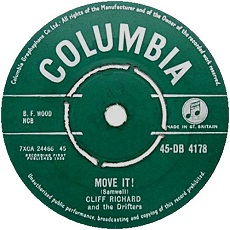
"Move It" is a song written by Ian Samwell and recorded by Cliff Richard and the Drifters. Originally intended as the B-side to "Schoolboy Crush", it was released as Richard's debut single on 29 August 1958 and became his first hit record, reaching number 2 on the UK Singles Chart. It is often described as Britain's first authentic rock and roll song. It is credited with being one of the first authentic rock and roll songs produced outside the United States. "Schoolboy Crush", written by Aaron Schroeder and Sharon Gilbert, had already been recorded in the US by Bobby Helms. Cliff Richard and the Drifters recorded their own version, which was intended to be the A-side of their debut single. However, when producer Jack Good heard "Move It", he insisted that Richard would have to sing that if he was to appear on Good's TV show Oh Boy! On the planned single, "Move It" was flipped to be the A-side and it went to number 2 in the charts, starting Cliff Richard on a career which included British hits through six decades.

"Mean Streak" is a song by Cliff Richard and the Drifters, released in May 1959 as their fourth single. It peaked at number 10 on the UK Singles Chart.

Cliff is the 1959 debut album of British singer Cliff Richard and his band the Drifters.
Alan Tarney is an English record producer and musician. He was born in Northside, Workington, Cumberland, but spent his teenage years in Adelaide, Australia, where he met his songwriting and musical partner Trevor Spencer. He is best known for his association with Cliff Richard and producing "Take On Me" by A-ha.
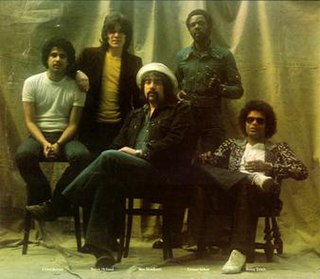
Hummingbird were a British rock band, formed in 1974 by Bobby Tench of The Jeff Beck Group. The band recorded three albums which were released by A&M Records in the United States, Canada, Australia, Japan and Europe and employed Ian Samwell as their producer. The original line-up included members of the second Jeff Beck Group, vocalist and guitarist Bobby Tench, keyboardist Max Middleton, bassist Clive Chaman, drummer Conrad Isidore and second guitarist Bernie Holland.

Don't Stop Me Now! is the eleventh studio album by Cliff Richard, released in 1967. It is his twentieth album overall. The album was arranged and conducted by Mike Leander.
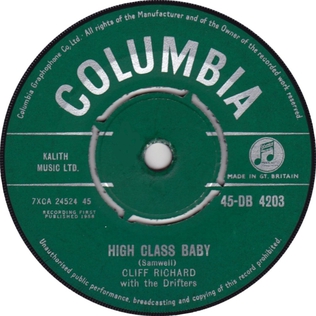
"High Class Baby" is a song by Cliff Richard and the Drifters, released in November 1958 as their second single. It peaked at number 7 on the New Musical Express chart.

"Livin' Lovin' Doll" is a song by Cliff Richard and the Drifters, released in January 1959 as their third single. Unlike their previous two top-ten singles, it only peaked at number 20 on the UK Singles Chart.

"Dynamite" is a song by Cliff Richard and the Shadows, first released in October 1959 as the B-side to the number one hit "Travellin' Light".
References
- 1 2 3 4 5 6 "Ian Samwell Obituary". The Guardian. 27 March 2003. Retrieved 13 January 2010.
- 1 2 3 4 5 6 7 8 9 10 11 12 Colin Larkin, ed. (2002). The Virgin Encyclopedia of Fifties Music (Third ed.). Virgin Books. p. 378. ISBN 1-85227-937-0.
- 1 2 3 Mindy, Giles (20 March 2003). "Ian Samwell, the father of British rock". Newsreview.com.
- ↑
- ↑ Spencer Leigh (17 March 2003). "Ian Samwell Obituary". The Independent. Retrieved 30 December 2016.
- ↑ Godwin, David. "DJ History". djhistory.com. Archived from the original on 26 August 2007. Retrieved 1 December 2010.
- ↑ "Ian Samwell, producer for Hummingbird". Iansamwell.com. p. 17. Archived from the original on 15 January 2009. Retrieved 19 December 2008.
- ↑ "Hummingbird credits". AllMusic .